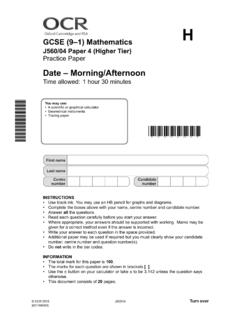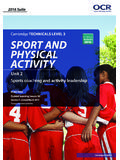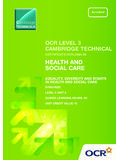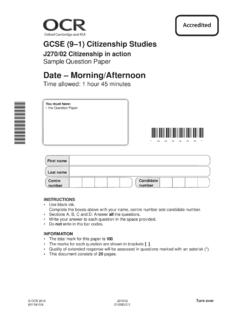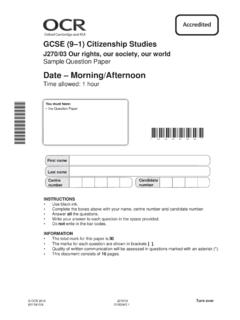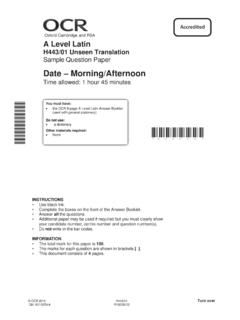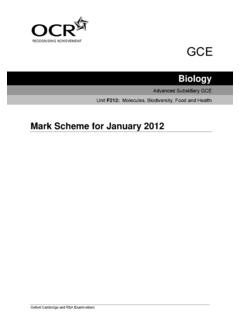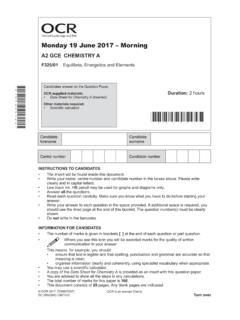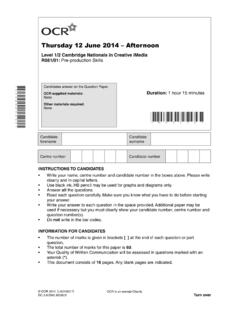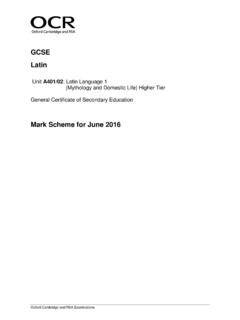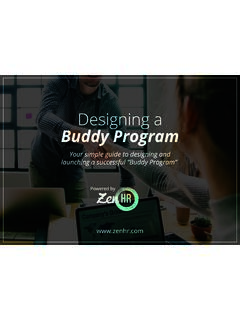Transcription of Cambridge Technicals Health and Social Care - ocr.org.uk
1 Oxford Cambridge and RSA Examinations Cambridge Technicals Health and Social Care Unit 2: Equality, diversity and rights in Health and Social care Level 3 Cambridge Technical in Health and Social Care 05830 - 05833 Mark Scheme for January 2019 OCR (Oxford Cambridge and RSA) is a leading UK awarding body, providing a wide range of qualifications to meet the needs of candidates of all ages and abilities. OCR qualifications include AS/A Levels, Diplomas, GCSEs, Cambridge Nationals, Cambridge Technicals , Functional Skills, Key Skills, Entry Level qualifications, NVQs and vocational qualifications in areas such as IT, business, languages, teaching/training, administration and secretarial skills.
2 It is also responsible for developing new specifications to meet national requirements and the needs of students and teachers. OCR is a not-for-profit organisation; any surplus made is invested back into the establishment to help towards the development of qualifications and support, which keep pace with the changing needs of today s society. This mark scheme is published as an aid to teachers and students, to indicate the requirements of the examination. It shows the basis on which marks were awarded by examiners. It does not indicate the details of the discussions which took place at an examiners meeting before marking commenced. All examiners are instructed that alternative correct answers and unexpected approaches in candidates scripts must be given marks that fairly reflect the relevant knowledge and skills demonstrated.
3 Mark schemes should be read in conjunction with the published question papers and the report on the examination. OCR 2019 Unit 2 Mark Scheme January 2019 3 Annotations These are the annotations to be used when marking Unit 2. Annotation Meaning Tick correct answer Cross incorrect answer Development of point (use only on questions where stated in the mark scheme) Level 1 Level 2 Level 3 Benefit of doubt (This does count as a mark so do not tick as well) Omission mark Too vague Repeat or Noted but no credit given Unit 2 Mark Scheme January 2019 4 Question Answer Marks Guidance 1 (a) One mark for a correct identification. (The) Equality Act (2010) (The) Human Rights Act (1998) 1 (1x1) Annotation: The number of ticks must match the number of marks awarded.
4 For incorrect answers use the cross. No other answers are acceptable. Must state Act The and date are not required. Crossed Out Responses: Where a candidate has crossed out a response and provided a clear alternative then the crossed out response is not marked. Where no alternative response has been provided, examiners may give candidates the benefit of the doubt and mark the crossed out response where legible. Unit 2 Mark Scheme January 2019 5 Question Answer Marks Guidance 1 (b) One mark for a correct identification. Four required. Response letter: Interview questions Tick ( ) four only A Do you have any disabilities? B How old are you? C Describe yourself in three words.
5 D Describe your approach to effective communication? E Do you have any children? F What skills can you bring to this job role? G What religion are you? H Why should we give you this job? 4 (4x1) Annotation: The number of ticks must match the number of marks awarded. For incorrect answers use the cross. No other answers are acceptable. If more than four boxes are ticked: Mark the first four only. Crossed Out Responses: Where a candidate has crossed out a response and provided a clear alternative then the crossed out response is not marked. Where no alternative response has been provided, examiners may give candidates the benefit of the doubt and mark the crossed out response where legible.
6 Unit 2 Mark Scheme January 2019 6 Question Answer Marks Guidance 1 (c) Two justifications required, two marks each. General: Disability, age, having children, religion are all protected characteristics Equality Act All four questions are not relevant to the job role - should not be a factor in choosing employees. Legally if the question is not relevant to the task/job role then it shouldn t be asked. Personal questions have nothing to do with skills or qualifications required for the job. A - Do you have any disabilities? Questioning a person about a disability would be grounds for disability discrimination. If a disabled candidate is rejected, it must be based on their performance at interview rather than having to make reasonable adjustments.
7 B - How old are you? Age does not affect an individual s ability to do a job effectively. Employers do not have the right to ask about someone s exact age, or to let it influence the decision to appoint or not appoint them. E - Do you have any children? This has nothing to do with the job role. It is unlawful to deny someone a job on the grounds that they have/are planning to have children. Could be grounds for discrimination by assuming they have family commitments to juggle with. G - What religion are you? This is not relevant to the job role. Religion/belief is a protected characteristic and should not be a factor in choosing employees. May be the basis of religious discrimination 4 (2x2) Annotation: The number of ticks must match the number of marks awarded.
8 For incorrect answers use the cross or appropriate annotation from the following: One mark: A basic statement with no elaboration. Two marks: A developed justification with additional detail. No repeats. Example 1 mark answers: it s a personal question it s against the law For 2 marks: The question is against the law because religion is a protected characteristic. Unit 2 Mark Scheme January 2019 7 Question Answer Marks Guidance Note: Can be asked do you have any specific requirements in order to perform this job effectively? this determines any adjustments that may be needed in order to accommodate an employee s needs. You can only ask for someone s date of birth on an application form if they must be a certain age to do the job, selling alcohol.
9 Then they can ask are you over 18? An employer can only ask for a date of birth on a separate equality monitoring form and the person selecting candidates will not be allowed to see this. 1 (d) Organisations: EHRC [Equality & Human Rights Commission] The Surgery their complaints procedure NHS complaints procedure Local Health authority/Trust Law firm - a solicitor / lawyer CAB (Citizen s Advice Bureau) Charities / support groups MIND, SEAP, Empower Me, Headway, AgeUK 1 (1x1) Annotation: The number of ticks must match the number of marks awarded. For incorrect answers use the cross or appropriate annotation from the following: If more than one organisation is given, mark the first one only.
10 Unit 2 Mark Scheme January 2019 8 Question Answer/indicative content Marks Guidance Content Levels of response 1 (e)* Ways to ensure interviews are carried out using correct procedures: Train the interview panel so that they know the correct procedures to avoid bias and are aware of protected characteristics. Have a mixed panel (age, gender, disabilities) - to ensure there are a range of viewpoints on the panel to make it fair and not biased. Consult relevant EHRC / legislation / policies to ensure compliance with legal requirements and best practice to provide equal opportunities. Select candidate on merit and not on anything else.
